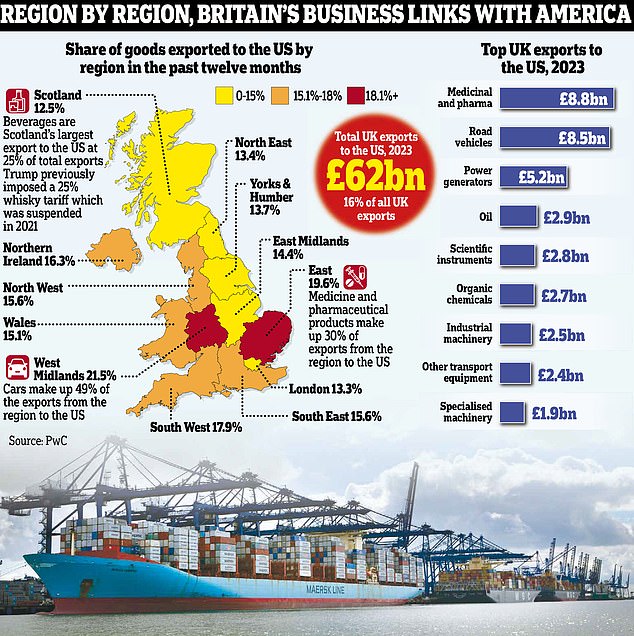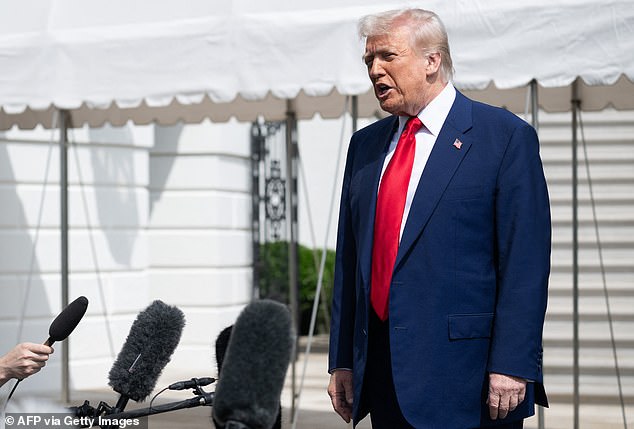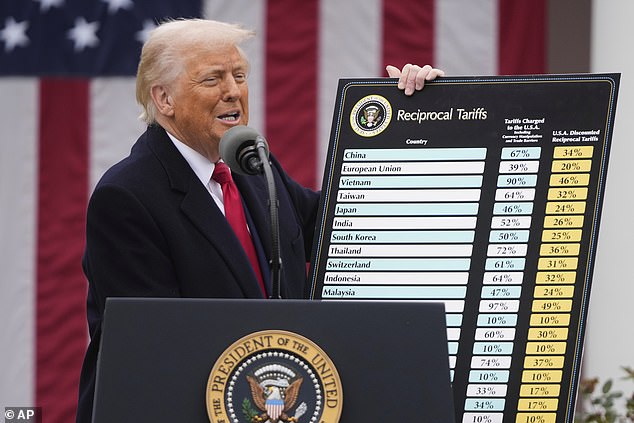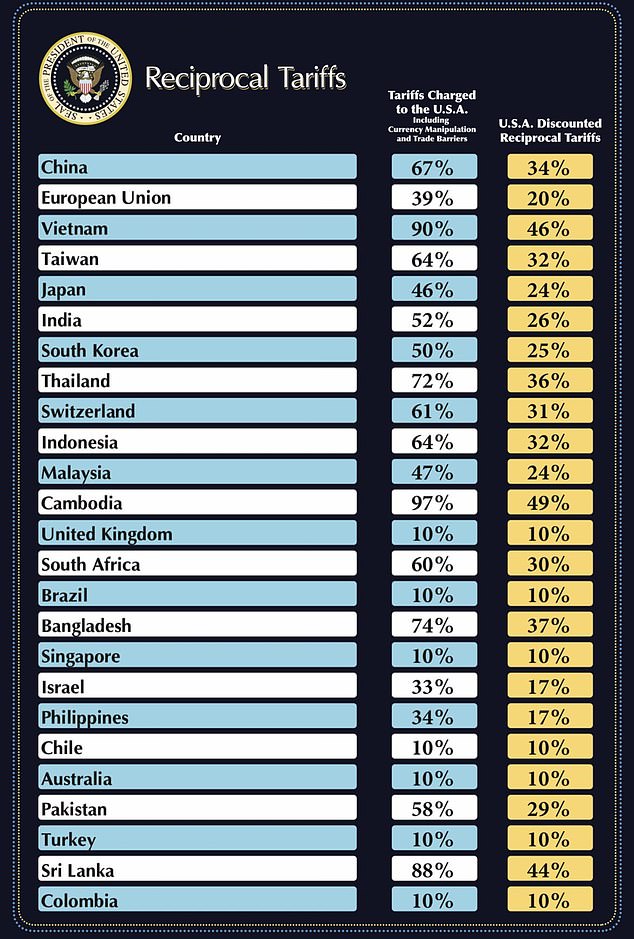Donald Trump’s sweeping tariffs have rocked the global economy, sending stock markets tumbling and countries trying to work out how they should respond.
We explain what the tariffs mean, what the impact could be on British businesses and consumers and what they mean for you.
What is a tariff?
A tariff is effectively a tax on goods coming into a country from abroad. They are paid by the company importing the items.
This normally has the effect of making the goods more expensive for consumers as companies pass on the cost of the tariff.
Because they push up the cost of imports, tariffs are used to give home-grown industries an advantage over foreign competitors.

Pictured: A breakdown of Britain’s business links with America by region. Medicinal and pharma and road vehicles formed some of the top UK exports to the US in 2023
What has Trump done with tariffs?
The US President announced that all imports into the US will be subject to a minimum tariff of 10 per cent from tomorrow.
But some countries that export lots of goods to the US, such as China, are set to be hit with higher levies from April 9.
Chinese exports were slapped with a 34 per cent ‘reciprocal’ tariff while the EU faced a levy of 20 per cent on its exports to the US.
The levies mean the effective tariff rate for all US imports has surged to 22 per cent from just 2.5 per cent last year, levels not seen since 1910.

Donald Trump announced that all US imports will be subject to a minimum tariff of 10%
What is Trump’s plan?
Mr Trump has said other nations have ‘ripped off’ the country for decades and that his tariffs are designed to ‘make America wealthy again’.
He has claimed that making it more expensive to import goods into America will mean more products will be made inside the country.
Additionally, it is hoped the measures will raise trillions of dollars that can help pay for deep tax cuts.
Trump aide Peter Navarro said the tariffs will raise £4.5 trillion, although a lot of the pain in the form of higher prices is likely to fall on US shoppers and businesses.
How will tariffs affect the UK economy?
While the UK managed to avoid some of the higher tariffs imposed on the likes of China and the EU, it has not escaped unscathed, with all British exports to America facing a 10 per cent levy.
Keir Starmer has warned ‘there will be an economic impact… both here and globally’. He is right.
The £60 billion of goods the UK sends each year to the US – our biggest trading partner – have just become £6 billion more expensive.

Trump holds up a giant chart showing some of the reciprocal tariffs on countries

The first of eight pages of reciprocal tariffs that the White House announced during Wednesday’s event in the Rose Garden
The National Institute of Economic and Social Research estimates that the tariffs will reduce growth in the UK to 0.6 per cent this year and close to zero next year – well below the 1 per cent and 1.9 per cent pencilled in by the Office for Budget Responsibility little over a week ago.
Economists at Barclays are even more gloomy, warning of a 1.5 percentage-point hit to UK growth this year, pushing the economy into recession.
The slowdown will all but wipe out the limited £9.9 billion of fiscal ‘headroom’ Chancellor Rachel Reeves left herself in her Spring Statement – setting the scene for more tax rises or spending cuts (or both) in the Budget this autumn.
Jobs are also at risk. The 25 per cent tariffs on cars could mean as many as 25,000 jobs are lost, according to the Institute for Public Policy Research.
How will this hit British consumers?
The rout on global stock markets will be a bitter blow to millions of British savers with pensions, Isas and other investments tied up in shares.
Households could also be hit by higher prices. Ministers are consulting business about a possible retaliation – and any reaction will likely cause pain for consumers.
Prices of American imports such as Tesla cars, Levi’s jeans, Jack Daniel’s bourbon, and Harley-Davidson motorcycles could all rise if the UK puts tariffs on US goods.
There is also the risk that the more general cost of doing business around the world will increase as supply chains are disrupted, meaning firms could be forced to put up prices.
One potential upside in the short term is that UK shoppers could see lower prices for some goods as countries look for an alternative destination for their wares to avoid US tariffs.
However, Britain could slap tariffs on countries such as China to stop them dumping cheap goods here.

Prices of American imports such as Tesla cars, Levi’s jeans, Jack Daniel’s bourbon, and Harley-Davidson motorcycles could all rise if the UK puts tariffs on US goods (file image)
Which parts of Britain will be worst hit?
The West Midlands and East of England produce more than 40 per cent of UK goods exported to the US every year – some £25billion worth.
Some 21.5 per cent of exports to the US come from the West Midlands, with cars making up 49 per cent of that, according to PwC.
Jaguar Land Rover and Aston Martin are both based in the region. The East of England makes up 19.6 per cent of exports to the US with medicines and pharmaceuticals accounting for 30 per cent.
What will tariffs mean for the global economy?
The longer-term impact will depend on whether this escalates into a trade war and for how long.
This raises the spectre of stagflation – a combination of high inflation and weak economic growth.
Ric Deverell, chief economist at Australian investment bank Macquarie, describes it as ‘the biggest trade shock in history’.
And a report by Aston University suggests it could wipe £1trillion off the global economy, fuelling fears that many countries will suffer recessions.
SAVE MONEY, MAKE MONEY

Isa cashback

Isa cashback
Up to £3,000 on new accounts and transfers

Fix energy bills

Fix energy bills
Check price cap beating deals with uSwitch

Fee-free Isa investing

Fee-free Isa investing
Free share and ETF dealing, no account fee
4.85% cash Isa
4.85% cash Isa
Flexible cash Isa with unlimited withdrawals
Sipp cashback
Sipp cashback
Up to £3,000 when you open a Sipp by 5 April
Affiliate links: If you take out a product This is Money may earn a commission. These deals are chosen by our editorial team, as we think they are worth highlighting. This does not affect our editorial independence. Terms and conditions apply on all offers.
Some links in this article may be affiliate links. If you click on them we may earn a small commission. That helps us fund This Is Money, and keep it free to use. We do not write articles to promote products. We do not allow any commercial relationship to affect our editorial independence.







